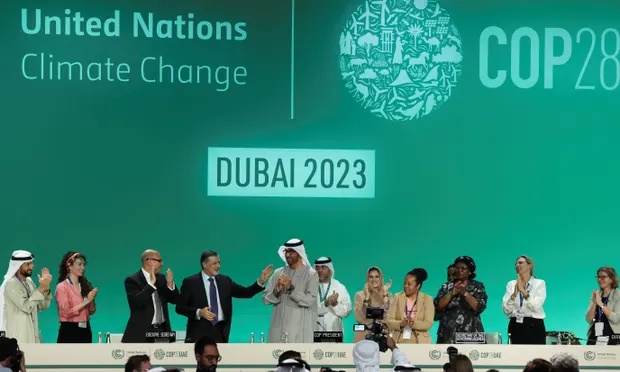Delegates at the United Nations COP28 climate talks in Dubai have agreed to a deal that would push nations to transition away from fossil fuels in order to curb climate crisis.
The deal, approved by almost 200 countries on Wednesday, was hailed by COP28 President, Sultan al-Jaber.
He called it an “historic package” of measures that offers a “robust plan” to keep the target of capping global temperatures at 1.5C above pre-industrial levels, within reach.
“We have language on fossil fuel in our final agreement for the first time ever,” said al-Jaber.

Instead of seeking a “phase-out” of fossil fuels, the deal rather calls for “transitioning away from fossil fuels in energy systems, in a just, orderly and equitable manner, accelerating action in this critical decade.”
That transition would be in a way that gets the world to net zero greenhouse gas emissions in 2050 and follows the dictates of climate science.
Officials from around the globe suggested the deal is an important step towards ending the use of fossil fuels.
U.S climate envoy, John Kerry said that both the United States and China intend to update their long-term climate strategies, hailing the agreement as one which “sends very strong messages to the world.”
After the deal was approved, French Minister for Energy Agnes Pannier-Runacher called it “a victory for multilateralism and climate diplomacy.”
“Now we need to put in place a plan to exit fossil fuels and we will be attentive to this,” she added.
Lord Nicholas Stern, chair of the Grantham Research Institute at the London School of Economics, noted that the agreement was historic and of real value.
He stated that deal explicitly recognises, for the first time in the outcome of a United Nations climate change summit, that the world needs to transition away from all fossil fuels, and towards cleaner alternatives, particularly renewables.
“It is clear that this transition must be worldwide, at scale, and urgent,” he said.
He also acknowledged that while the text of the decision may not be as strong as some have hoped, “it is clear that this transition must be powerful and urgent to achieve net zero emissions of greenhouse gases globally by 2050.”
Calls For Concrete Action Made
Moreover, Lord Nicholas Stern made a call for concrete action in order to achieve the goal of transitioning away from fossil fuels.
He said, “Countries must now respond to the outcome of COP28 through a huge increase in investment in zero-emissions and climate-resilient economic development and growth, particularly in developing countries.
Manuel Pulgar-Vidal, former COP20 President, noted, “the Earth is down but not out, as countries agree to transition away from fossil fuels, but fall short of consensus on the full phase out of coal, oil and gas at COP28.”
“In this critical decade, all countries must enhance the ambition and implementation of climate action,” he stressed.
The Chinese delegate noted that it is China’s view that climate action must feature both ambition and pragmatism.

“The key is still pragmatic actions and delivering on the commitments. The means of implementation must match the ambitions,” he said.
“Developed countries have an unshakable historical responsibility for climate change and must take the lead to materialise net zero as soon as possible. Deliver without delay to ensure a global just transition. It is China’s core that we have but one planet. To tackle the climate crisis, the international community must react and unite and resist the unilateral measures that undermine the process. China will firmly implement the national strategy for climate action.”
Chinese Delegate
Also, the Indonesian delegate said, “Keeping 1.5 alive can only be done with action… We need concrete implementation.”
The delegate added that Indonesia stands ready to work with all parties on implementation.
READ ALSO: Cracks Begin To Show In U.S And Israel’s Stance On Gaza War




















